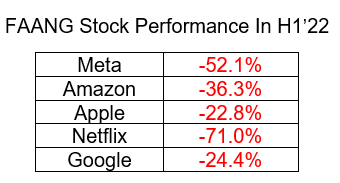Zinger Key Points
- FAANG stocks fell by an average of 30% in the first half of 2022
- Netflix was the worst performer among the category
- Apple notched up the smallest loss
- Get 5 stock picks identified before their biggest breakouts, identified by the same system that spotted Insmed, Sprouts, and Uber before their 20%+ gains.
The first half of 2022 was nightmarish for the stock market, with fears of an imminent recession and supply chain disruptions working in the mind of investors.
Tech stocks have invariably led the broader market in the past, be it a rally or a retreat, and this time was no exception. Despite fairly robust fundamental performances amid the trying backdrop, big techs came under significant selling pressure.
Here's a look at how some of the high-profile tech stocks, commonly referred to using the acronym "FAANG" fared in the first half of the year:
The FAANG Stocks
Meta Platforms, Inc. META
Amazon, Inc. AMZN
Apple, Inc. AAPL
Netflix, Inc. NFLX
Alphabet, Inc. GOOGL GOOG
No Winner Emerges: All the FAANG stocks incurred losses for the first half of the year, and more importantly, their losses were worse than the broader market. Apart from the market-wide pessimism, most were also left grappling with company-specific issues.
Meta: Meta, the parent of the flagship social media platform Facebook, is facing competitive pressure. China's Byte Dance-owned TikTok short video app has been giving its bigger rival a run for its money for some time now. Meta was left with no option but to launch its own version of the video clip format platform.
As Meta introduced Reels within Instagram and then on Facebook per se, it was forced to promote it at the expense of its highly-monetized segments such as Feeds and Stories.
Meta's ad revenues continue to take a hit from Apple's app tracking transparency crackdown. The privacy changes reportedly will impact Meta's revenue by about $13 billion in 2022.
Related Link: China's COVID-19 Shutdown Is Beginning to Bite Apple, Says Analyst
Amazon: For Amazon, it was the case of a tougher comparison against the pandemic years. The e-commerce giant benefited from the stay-at-home scenario that prevailed in 2020 and for much of 2021 when people splurged on online purchases.
A stock split the company implemented in June did little to reverse the negative sentiment toward the stock.
Apple: Apple continued to deliver, persisted with its shareholder return policy, and kept on rolling out superior products and services.
The company is heavily reliant on China for the production of its hardware products, and so when COVID struck in the country, investors began discounting production shortfalls. China is also a key market for Apple from the demand perspective.
Netflix: Netflix was the worst-performing FAANG stock in the first half. The company reported a massive loss of net subscriber adds in the first quarter, a function of competition and saturated penetration in its key markets. The company outlined a few fixes, including a crackdown on password sharing and launching an ad-supported service. Analysts, however, think any recovery in the company's fundamentals could be a long-drawn-out process.
Alphabet: Google parent Alphabet's weakness is largely due to the industry-wide uncertainties that have the potential to impair its fundamentals.

Other big tech stocks such as Advanced Micro Devices, Inc. AMD, Nvidia Corporation NVDA and Microsoft Corporation MSFT also had a bad outing in the same period. These stocks shed 46.9%, 48.4% and 23.3%, respectively.
In comparison, the broader S&P 500 and the Nasdaq Composite Indices were down 20.6% and 29.5%, respectively in the first half of the year.
© 2025 Benzinga.com. Benzinga does not provide investment advice. All rights reserved.
Trade confidently with insights and alerts from analyst ratings, free reports and breaking news that affects the stocks you care about.